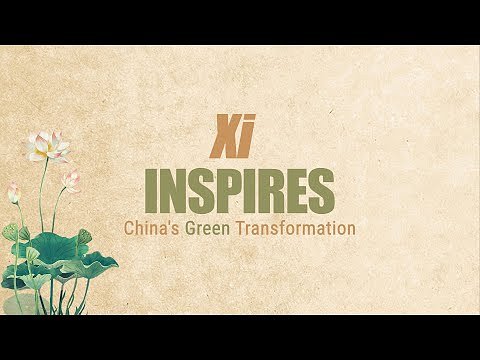
China's Green Shift: Beyond Manufacturing, a New Climate Philosophy Takes Root
Beijing is redefining climate leadership, framing environmental protection not as a constraint on growth, but as its engine. But does this philosophical shift translate into real emissions reductions?
China's Green Shift: Beyond Manufacturing, a New Climate Philosophy Takes Root
By George Millen – November 14, 2025
BEIJING – For decades, the narrative surrounding economic development often pitted growth against environmental protection. But China is attempting to rewrite that script, positioning itself not just as a leading investor in clean energy, but as a philosophical innovator in the fight against climate change. A recent report highlights President Xi Jinping’s vision of integrating environmental protection with economic growth – a strategy Beijing believes can unlock a new era of sustainable development.
While China’s dominance in renewable energy production and electric vehicle manufacturing is well-documented, the country’s ambition extends beyond simply building the technology. This shift is being framed as a fundamental departure from traditional economic models, one where ecological conservation isn’t a cost center, but a catalyst for innovation and wealth creation.
“There's a clear intent to redefine climate leadership,” explains one analyst specializing in Chinese environmental policy. “It's no longer about adhering to international agreements; it’s about presenting a different way of doing things – one where environmental sustainability is inherently linked to economic prosperity.”
Manufacturing Powerhouse & Beyond
China’s ascent as a clean energy powerhouse is undeniable. The country is projected to account for 60% of global renewable capacity expansion by 2030, with nearly two-thirds of all EVs sold globally manufactured within its borders. In 2024, China added an unprecedented 445 gigawatts of renewable capacity – exceeding many Western nations’ entire installed power base. This has catapulted China into a leading position in technologies like solar photovoltaic (PV), wind power, and battery storage.
However, this manufacturing prowess is just one piece of the puzzle. Beijing is now pushing for a more holistic approach, emphasizing green industrial policies, circular economy initiatives, and a transition away from reliance on fossil fuels. “They’re not just building solar panels,” explains another source close to the government’s energy planning. “They're creating an entire ecosystem around green technologies – from raw material sourcing to end-of-life recycling.”
The Philosophical Shift: ‘A Community of Life’
President Xi Jinping’s rhetoric consistently frames environmental protection as integral to national development. He advocates for a vision of “a community of life for man and Nature” and prioritizes ecological conservation, calling for a green and low-carbon economic system. This messaging is a significant departure from previous decades, where economic growth often took precedence over environmental concerns.
“There’s a concerted effort to weave this ‘ecological civilization’ concept into the national narrative,” explains one academic specializing in Chinese political thought. “It’s about aligning the country’s development trajectory with the principles of sustainability and ecological harmony.”
Emissions: The Critical Test
Despite the ambitious rhetoric and significant investments, the critical question remains: is this philosophical shift translating into actual emissions reductions? While China remains the world’s largest emitter of CO2, recent data offers a glimmer of hope.
For the first 18 months, starting in March 2024, China’s CO2 emissions have stabilized, even falling in certain periods. Global Carbon Project analysts project China’s emissions to increase by a relatively small 0.4% in 2025, significantly slower than previous years. This stabilization is attributed to a combination of factors, including the rapid deployment of renewable energy, increasing energy efficiency, and a slowdown in coal consumption.
However, it’s a nuanced picture. While emissions from key sectors like transportation and industry are declining, China still relies heavily on coal, accounting for 56% of its primary energy consumption. Furthermore, the country’s continued investment in coal-fired power plants raises concerns about its long-term commitment to decarbonization.
“They’re making progress, but it’s not a linear trajectory,” cautions an energy analyst based in Beijing. “There are still significant challenges – particularly in sectors like cement, steel, and chemicals – that need to be addressed.”
The Role of State Media
The narrative surrounding China’s green shift is also actively shaped by state-controlled media outlets like China.org.cn. As a state-owned enterprise, these platforms play a crucial role in promoting the government’s vision and framing its policies in a favorable light. While offering valuable insights into China’s environmental initiatives, it’s important to approach their reporting with a critical eye, recognizing the inherent potential for bias.
A New Era of Climate Leadership?
China's ambitious climate goals and investments in renewable energy are undeniably impressive. The country's philosophical shift towards integrating environmental protection with economic growth is a potentially game-changing development. However, the success of this strategy hinges on Beijing’s ability to translate its rhetoric into concrete action, rapidly decarbonize its economy, and address the challenges posed by its continued reliance on fossil fuels.
Whether China truly emerges as a new era of climate leadership remains to be seen. But one thing is certain: the country's actions will have a profound impact on the future of the planet. The world is watching to see if China can successfully navigate this complex transition and prove that sustainable development is not just a possibility, but a reality.
